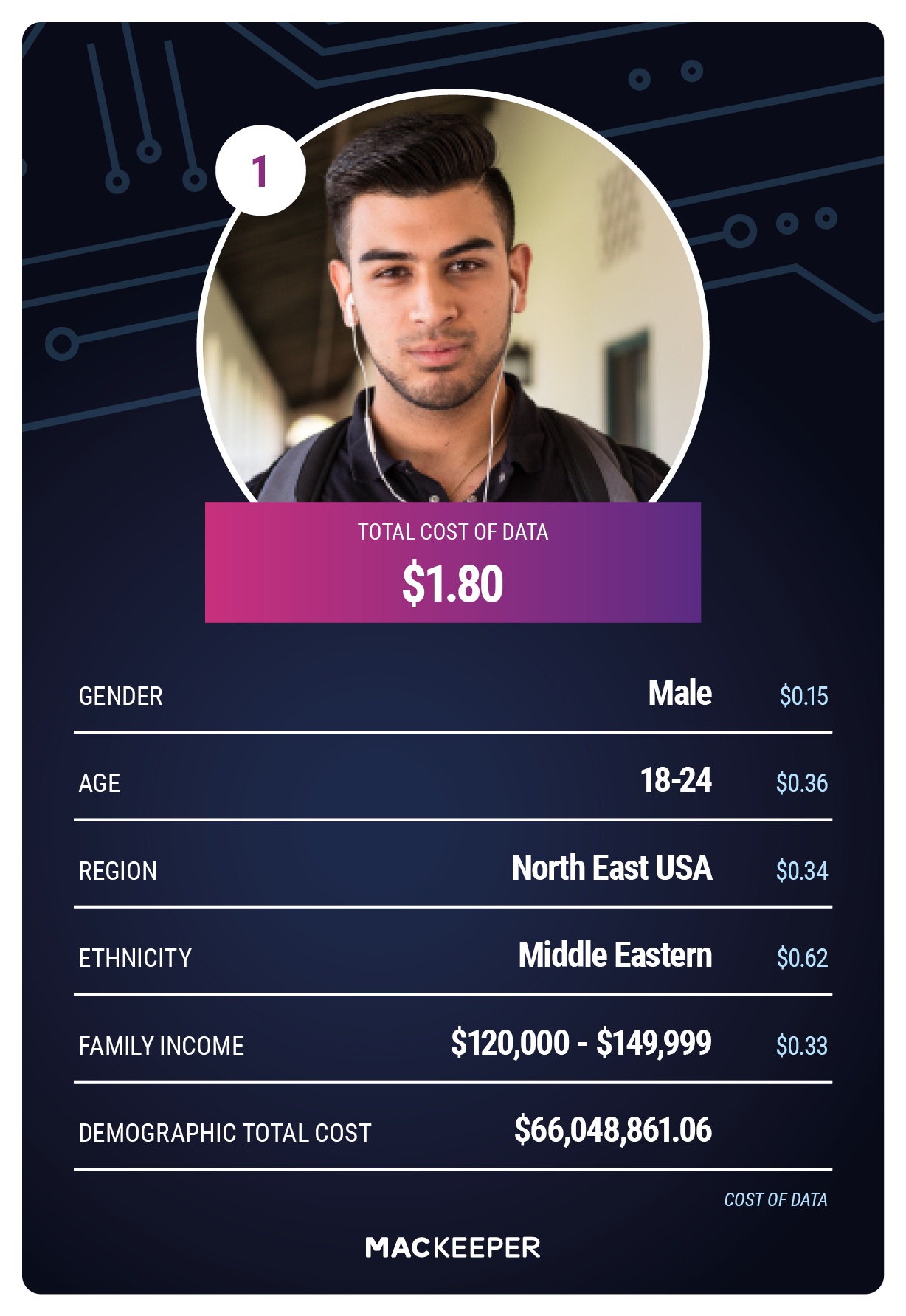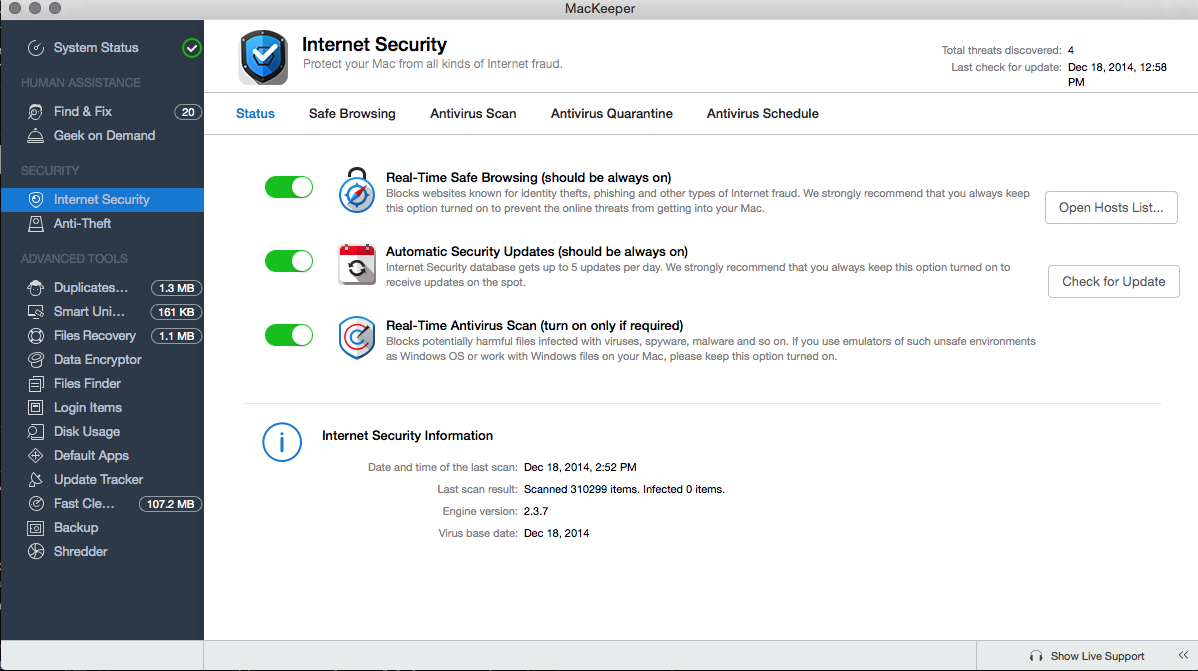How Much Does MacKeeper Cost? At the time this review was originally written, MacKeeper was undeniably expensive. If you chose to pay for it monthly, it was $16.95 per month, or a whopping $203.40. I got 2 mac's both mac book pro's and 2 licence's for my Mac's for Clean My Mac 2 would cost 54.95 pounds and a 1 licence for MacKeeper would cost also 54.95 pounds. So could some one tell me which program to buy.
Computer hacks are a common part of modern life.
Indeed, according to Security magazine, a hack occurs somewhere in the world once every 39 seconds. And cybercrime generates more money than the illegal drug trade - a report from the Herjavic Group estimates that cybercrime will cost the world over US$6trillion in revenue by 2021.
These days computer hacks are as common as weather changes. Today feels sunny and safe but tomorrow could be completely different. Luckily, Clario is here to safeguard your computer against all types of digital threats. It's a unique fusion of protection software and human intelligence on demand, 24/7. Download Clario and make sure your digital life is safe.
So, if you’ve been hacked, you’re not alone. Being the victim of a computer hack is - at best - awfully inconvenient. So, here are the steps on minimizing that damage.
Firstly, let’s look at signs that you might have been hacked..
Telltale signs your computer has been hacked
You might recognise suspicious events when you see them, a general sign that something’s not right and your computer or internet browsing is not operating as it should.
More specifically, you might have been hacked if:
- Google searches are redirecting to sites you didn’t intend to visit.
- There’s been an installation of an app that you’re unfamiliar with.
- You’re seeing suspicious pop-up ads, such as fake antivirus warnings. (Please do not click on these, by the way!)
- People on your email contact lists receive social media invites that you didn’t send.
- Your computer slows down or freezes.
- You notice rogue, third-party activity ranging from the very small (keyboard strokes, your mouse moving) to the very big (money taken from your online bank or credit card account).
Reasons why you were hacked in the first place
Hackers, like any criminals, are opportunists. Just like a shop window left open or a bag left unattended, some online activities leave you vulnerable to hacks.
Allen test papers pdf 2019 neet. For safer browsing, you should:
- Avoid opening suspicious email attachments.
- Make sure your operating system (OS) is up to date: you’ll be regularly informed of updates on your phone or computer. Don’t put off installing these updates as they help keep your device’s security current.
- Use strong passwords, including numbers, letters and punctuation – and not your mother’s maiden name! (We have a guide to creating more secure passwords if you’d like to know more.)
For more on safe browsing, check out our guide to malware.
What to do right away after your computer gets hacked
Okay, firstly, don’t panic. Nothing harmful may have happened yet. And secondly, you can probably mitigate anything bad that has happened.
Here’s what to do…
1. Reset your passwords
This might seem onerous at first – you have a lot of passwords after all! But focus on the key places; social networks (Facebook, Twitter, Instagram), emails, devices (phone, laptop and so on) and anywhere involving credit cards and finance (shopping, banking).
2. Log out of all online accounts
After you’ve reset passwords, log out. It’s easy to forget that we tend to have our social media (and other online accounts) set to automatically log us in.
3. Disconnect from the internet
Next, shut down contact to the internet: that means turning off WiFi on your computer or Mac, and switching phones and tablets to airplane mode.
4. Remove external hard drives
Remove any external drives. This means USB sticks or external hard drives. Be sure to “eject” them first. (Go to the appropriate folder, then click “eject”).
If you’re certain you’ve been hacked, you might want to remove the computer’s hard drive too. Back up any files you have (you can even save them to the cloud, like Google Drive or email small files to yourself); switch off all power sources; then once the computer is shut down, you can remove the hard drive (the big black rectangle within your laptop). Its location will vary depending on make or model, so consult the manual (hard copy or online) or, if you’re not comfortable doing this, find an IT professional to help.
5. Scan your computer for malware and viruses
This can be done with your own devices’ security software, or with third party security. For more information on running a scan, check out our guide to getting rid of viruses.
6. Wipe your hard drive (if necessary)
If your scan reveals a virus or hack, you can (and probably should) wipe your hard drive, then reinstall your OS. Wiping means to permanently erase, so be aware that whatever you’re deleting will be gone for good unless you back it up.
Do not just manually delete files: they’ll still exist somewhere in your hard drive. Instead, use a downloadable programme to carry out the wipe. Like a virus scan, a wipe will let you know when it’s been carried out completely.
Mackeeper Software
7. Spread the word
Unfortunately, your hack might have affected people in your contact list: friends and families might have been emailed by a hacker posing as you. If that happens, it’s important to contact those who have been emailed or texted to let them know you weren’t behind the message and you may have been hacked.

And if your hack was the result of clicking on a suspicious email or attachment, it’s a good idea to warn others of the attack. Similar hacks tend to happen in waves, as multiple victims are contacted at a time.
8. Closely monitor your credit and financial accounts
After the hack, keep an eye on your online expenditures, regularly checking your bank and credit card accounts.
9. Install security software
Naturally, up-to-date, reputable security software is the best line of defense against a future hack.
How to avoid being targeted by computer hackers again
Anyone can fall victim to a hack, but there are ways to minimize the risk.
Step 1: Read up on how to detect online scams

Sadly, hackers are always looking for ways to breach security. It’s a good idea to keep on top of unwelcome trends related to hacking, phishing and other forms of attack.

Step 2: Maintain strong passwords
Remember to keep strong passwords and to change them regularly. Include a combination of numbers, letters and punctuation and try to use different passwords for your various online accounts.
Step 3: Don’t leave your devices unattended in public
Even two minutes is time enough for a hacker to gain personal information or sow the seeds for a later hack.
Step 4: Keep files backed up
It’s good practice to maintain important or sensitive files beyond your computer, ideally in multiple places, USB, external hard drives, cloud storage, or if you’re feeling especially cautious, all of the above.
Step 5: Ensure your firewall is properly configured
Does Mackeeper Cost Money
You should have a firewall installed on your computer. A firewall in a building is a sealed wall that prevents the spread of fire. On your computer, it works the same way.
You can configure your firewall to block communication between your computer server and another. This firewall block could filter based on suspicious IP addresses (other specific servers), potentially dangerous phrases, or even a website.
Clario - peace of mind for the digital age
Clario are industry-leaders in all things cybersecurity.
We have several articles about safer online activity, covering everything from how to get rid of a computer virus to a comprehensive guide to malware.
We’d like to stay in touch.
How Much Does Mackeeper Cost
We’ve got something special to share! Enter your contact details below to be among the first to find out about the exciting changes we’ve got in the works as well as to receive special promotions.
Friday night funkin free chromebook. Description Friday Night Funkin is a open source and free-to-play rhythm game reminiscent of the classic Dance Dance Revolution. This version is optimized for. If anyone wants to play this game on a shit Chromebook then here's the link for it as well as a few popular mods, which are also optimized for Chromebooks. (If you want any link to a mod not listed, comment the mod and I will try to find it.) Friday Night Funkin': FNF Whitty: Whitty FNF Atsuover: Annie FNF Zardy: Zardy FNF Carol: Carol FNF Miku. Play Friday Night Funkin game online in your browser free of charge on Arcade Spot. Friday Night Funkin is a high quality game that works in all major modern web browsers. This online game is part of the Arcade, Skill, and Funny gaming categories. Friday Night Funkin has 12756 likes from 14373 user ratings. If you enjoy this game then also play games Friday Night Funkin: B-Side Remixes and Friday Night Funkin’. You can play Friday Night Funkin unblocked and its most popular mods for free online. On computer at home, on chromebook or at school, you can practice your rythm and skills anywhere! Credits: Programming: ninjamuffin99 / Art: PhantomArcade.
Thanks for your subscription!
Does Mackeeper Cost Anything
You’ll be the first to know about our updates. Please keep an eye on your mailbox.
